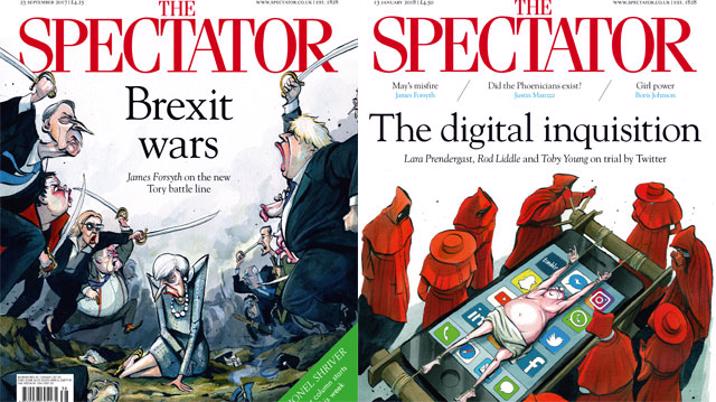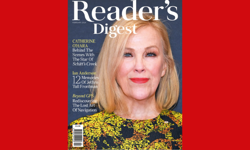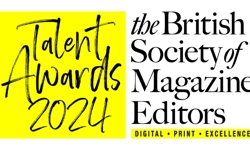
The referendum on whether Britain should stay in Europe nearly did for The Spectator. Not the 2016 referendum that is, when the magazine’s support for Brexit was in line with around two thirds of its readership, but the 1975 referendum on whether the UK should remain in the European Community. The Spectator was one of the few publications to support leaving, flying in the face of public opinion. “It became a bit of a political obsession for the proprietors of The Spectator at the time. It banged on about Europe and almost folded,” explains the magazine’s current editor Fraser Nelson.
Then the late Alexander Chancellor took over as editor. “He resurrected it and created the modern Spectator. He wanted it to be more of a cocktail party than a political party. What he did was the biggest, most important job and the rest of us have piggy-backed on it.” Nelson is possibly being too modest. The Spectator, the oldest weekly magazine in the world (there is a Serbian monthly which is older), is now selling more copies than it has ever sold in its long history - the magazine will celebrate its 190th birthday in July.
Circulation success
The total worldwide circulation figure combining print and digital editions for the six months to the end of 2017 was 73,328, up nine per cent year-on-year. Print sales during this period reached a new high of 62,940, while UK subscriptions rose by 11 per cent last year, the “fastest rise for a decade”.
Nelson insists that today’s Spectator is much more than just a political magazine and is not always pro-Tory: “More often than not when it comes to general elections our sympathies lie with the Conservatives, but we’re not a Tory fanzine and we would not satisfy our readers or the Conservative party if we were.” He admits, however, that having a Tory administration has probably been good for sales. “It’s certainly the case that if you want to know what is happening inside the Conservative government and you don’t read The Spectator, then you’re not really getting the whole picture.” The magazine’s political team, James Forsyth, Katy Balls and Isobel Hardman, have excellent contacts and are in high demand for commentary, but where The Spectator has really excelled is in reinventing its right of centre political insight for the digital age with its Coffee House blog and podcasts.
“The one thing that has gone right for us is that we have got the relationship between print and digital correct,” says Nelson. “I think when print titles stumble, it’s not digital that’s to blame, it’s a botched response to digital. People can panic, they can assume that the future lies in having shrill voices fighting with one another – that will get you lots of traffic, but people won’t pay you for it. I’ve sought to protect and project the voice, the character of The Spectator, but how the magazine presents itself in various formats, I’ve sought to change that utterly.”
He is adamant that “the website is there to get subscriptions”. In return for providing some basic details, readers can access three articles a week online for free. After that, there is an introductory offer of 12 issues for £12. More than two thirds of readers who take up the offer move onto a permanent subscription: “Once you see what The Spectator is about, then you’re hooked. Our great publishing strength is our very high renewal rate. Therefore, the challenge is to get people to try us and to get a habit that they never thought they would get,” says Nelson.
A secret garden
He engages with social media for business rather than fun. “Social media is the new newsstand for us. We sell about 8,000 at newsstand in the UK, about 75,000 in total, I’ve got about 170,000 Twitter followers. Twitter for me isn't a pleasure, it’s a duty. I use it to try to give people a sense of The Spectator and its range.”
“The hope is they will discover The Spectator is not a male, Tory, political, boring magazine, they’ll discover that it’s a secret garden of all sorts of things you’d never have thought of.” He points to Jeremy Clarke’s ‘Low Life’ column, the ‘Dear Mary’ agony aunt column and the extensive coverage of books and the arts. What really matters, says Nelson, is great writing, with columnists such as Matthew Parris, Charles Moore, Toby Young and more controversially, Rod Liddle. As a small publication, The Spectator cannot afford much in-depth audience research, but when they did question younger readers a few years ago, they discovered that they were coming to the magazine to read Taki, one of its oldest columnists. “People buy The Spectator for a certain insurgent spirit and that appeals across all age groups,” says Nelson.
The Spectator moved to its current premises in a bow-windowed town house overlooking St James’s Park just over a decade ago, but it feels as though the magazine could have been here for the whole of its almost two centuries. Nelson’s office is a cosy book-lined room decorated with framed magazine covers and a glamorous black and white photograph of Taki with Joan Collins. Furnished with comfortable sofas, it doubles up as a recording studio for The Spectator podcasts. Being a stone’s throw from Westminster means it is easy to tempt politicians and other eminent guests over to be interviewed, with the added allure of a well-stocked wine cellar. “Berry Bros sponsor our main podcast, because we think they are a good brand match; we drink quite a lot in this building and Berry Bros are suppliers of our house red,” says Nelson. Pol Roget is another sponsor. The podcasts, which were started ‘just for fun’, now attract 100,000 listeners a week. As well as the main Spectator podcast, there is ‘Holy Smoke’, an irreverent religious podcast hosted by Damian Thompson, the ‘Americano’ podcast on US affairs, and a books podcast hosted by literary editor Sam Leith. “The big question is, can you use podcasts to support subscriptions?” asks Nelson. “I like to think out of 100,000 listeners, there might be an extra 4,000 subscribers in there for us.”
Flourishing events programme
Events is a growth area for the magazine with speakers including Michael Wolff, Kofi Annan and George Osborne. Rather than being a big money-spinner, they are intended to enhance the Spectator brand. Some events are for subscribers only, to build up the benefits of subscription, such as Stephen Pinker in conversation with Sam Leith, or an annual tea party in the garden of the Spectator building. Others are more ambitious. “We’re currently hoping to have Rod Liddle at the London Palladium,” Nelson reveals. “Our aim is to sell out the Palladium with just one journalist talking. That would be quite an audacious thing to do.”
“The trick is to never stop innovating,” says Nelson, whose sights are set on Instagram now that it is possible to share quotes on the platform. “The way people consume words is changing all the time. It’s just a thrilling time to be in this industry. For a long time when I was editor, what I did didn’t work. In the last few years, that has really changed. I’m not complacent enough to think this is now happily ever after. Often you won’t know what you’re doing right, let alone what you’re doing wrong and half the battle can be working that out.”
Nelson was recruited first to The Scotsman and then to The Spectator, where he started as political editor, by his fellow Scot, Andrew Neil, chairman of the magazine’s parent company Press Holdings, which also owns The Daily Telegraph. He says that Neil restricts himself to the business side of the operation; “In nine years, Andrew has never spoken to me about content other than to ask me what’s on the cover. His style is to get people he trusts and then leave them alone. If you’re run financially by a journalist, then his objective is going to be to bring the money to the journalism, rather than move the journalism to where the money might be.”
He is fortunate to have in the Barclay brothers, supportive proprietors who do not interfere in the editorial process. “My remit is to make them proud. They are just the best proprietors that any editor could want,” he enthuses. “Often publications like ours are owned by people who want to swan about parties posing. The Barclays have got no interest in that at all. They just want us to prosper. They would quite like us not to lose money, which we don’t.”
When it came to the recent Brexit referendum, the Barclays gave Nelson no indication of which way they thought the magazine should lean. He walked across St James’s Park to their offices to show them the magazine’s editorial backing Leave and they simply said: “That’s great, so long as you’ve set the ground properly.” A self-declared Europhile, Nelson came round to the position “broken-heartedly after Cameron’s renegotiation” and he hopes this time round, The Spectator provides a more measured forum than the polarising shrieks of social media. “I think most people can see the arguments of the other side, which is why I’m worried as an editor when you get partisan writing and people assume the other side are complete idiots. I like to think the magazine can be a place where you respect people with differing views and a whole bunch of views can be made in a civilising way. That is right now editorially my biggest mission.” It looks as though his approach – delivering high quality writing and commentary via a number of different platforms – has paid off.












